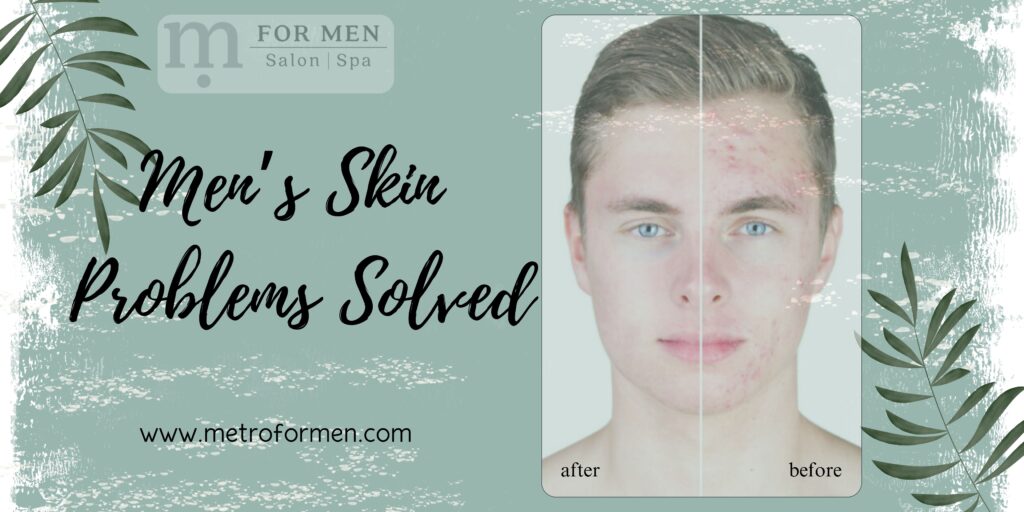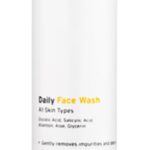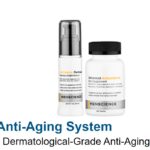
Did you know your skin is actually the largest organ of your body? Skin needs care and attention just like other vital organs. Not just to look good but also to stay healthy and avoid annoying skin problems. Proper mens skin care can help them avoid the most common skin problems for men. Read today’s blog post to learn about the most common skin problems men experience and what they can do to remedy skin issues.
Adults Can Get Bad Acne
It is common to think that acne only affects teenagers. However, men can still experience acne as adults, stemming from environmental causes. This includes humidity, stress, and substantial sweating. For this reason, if you are going through a lifestyle change, such as moving to a new location or hitting the gym more frequently, and out of the blue experience acne, you should consider seeking professional acne treatments. Even entertain acne medicine if the issue worsens. Poor skincare habits may also lead to pimples. Therefore, washing your face and exfoliating the skin helps remove dead skin cells, bacteria, and excess oil. These three things are major factors that clog pores and lead to acne. Additionally, frequently washing the hair is also important because oil can build up around the scalp and cause pimples to arise on the forehead.
Face Washing and Acne
Something to note though. washing your face can also cause more acne, How is that possible you ask Washing your face can contribute to adult acne if not done properly. Here are some potential reasons:
- Over-Washing: Washing our faces too frequently can strip the skin of its natural oils. This can lead to dryness and irritation. Prompting the skin to produce more oil to compensate, which can clog pores and cause acne.
- Harsh Cleansers: Using harsh soaps or cleansers can disrupt the skin’s natural barrier. Leading to irritation and inflammation. This can make the skin more susceptible to acne.
- Improper Technique: Scrubbing too hard or using abrasive washcloths can irritate the skin and cause micro-tears. This can lead to inflammation and acne.
- Wrong Products: Using products that are not suitable for a skin type, especially those that are too oily or comedogenic (pore-clogging), can contribute to acne.
- Residual Products: Not rinsing the face thoroughly can leave residue from cleansers on the skin, which can clog pores and cause breakouts.
- Contaminated Tools: Using dirty towels, sponges, or brushes to wash your face can introduce bacteria to the skin. This calls also lead to acne.
- Water Temperature: Using water that is too hot can strip the skin of its natural oils. However, water that is too cold may not effectively remove oil and dirt. Warm water works best.
For these reasons, we suggest talking with a skin care specialist or dermatologist who can offer advice on preventing adult acne.
Best Face Wash For Mens Skin Care
Men need to consider products that contain beneficial ingredients that help prevent skin problems. When looking for a quality face wash, especially if looking to prevent adult acne, men should seek these ingredients:
- Salicylic Acid: This beta hydroxy acid (BHA) helps exfoliate the skin and clear pores, making it effective in preventing and treating acne.
- Benzoyl Peroxide: An antibacterial agent that kills acne-causing bacteria, reduces inflammation, and helps clear existing acne.
- Glycolic Acid: An alpha hydroxy acid (AHA) that exfoliates the skin, removes dead skin cells and promotes cell turnover to keep pores clear.
- Tea Tree Oil: A natural antibacterial and anti-inflammatory ingredient that can help reduce acne-causing bacteria and soothe the skin.
- Niacinamide: Also known as vitamin B3, niacinamide helps reduce inflammation, minimize pore appearance, and regulate oil production.
- Zinc: Zinc helps control oil production and has anti-inflammatory properties that can help reduce acne severity.
- Aloe Vera: A soothing and hydrating ingredient that can help calm irritated skin and reduce redness associated with acne.
- Charcoal: Activated charcoal can help absorb excess oil and impurities from the skin, keeping pores clear.
- Hyaluronic Acid: While not specifically for acne, this ingredient helps keep the skin hydrated without clogging pores, which can prevent the overproduction of oil.
- Sulfur: Sulfur has antimicrobial properties and helps to dry out the surface of the skin, reducing acne severity.

When choosing a face wash, it’s important to select products labeled as “non-comedogenic.” This means these products are less likely to clog pores. Additionally, men should consider their skin type. Men’s skin type can be oily, dry, combination, or sensitive. Then, choose a product that suits their specific needs. FOR MEN Salon and Spa’s favorite men’s face wash is Menscience Androceuticals Face Wash.
A Simple Mens Skin Care Routine
Itchy Patches Of Eczema
Having eczema is not always a big deal for most people as it typically only leaves behind small bumps that are not easily noticeable. However, some people do experience more severe cases that can be extremely itchy. Itching these areas only makes the eczema worse and leaves a red scratched-up rash. Also scratching only makes the sufferer more vulnerable to infections. It also makes the infected areas even more irritated and itchy. Typically, eczema occurs more in dry climates and can also be the result of stress. Keeping skin moisturized is the best way to keep eczema and its effects at bay. Seek help if eczema only seems to get worse.
Mens Skin Care Tips for Eczema
Dealing with eczema can be mens skin care challenge. But with the right skin care routine, men can manage their symptoms effectively. Here are some tips:
- Moisturize Regularly: Use a thick, fragrance-free moisturizer to keep the skin hydrated. Apply it immediately after showering to lock in moisture.
- Use Gentle Cleansers: Choose mild, fragrance-free, and soap-free cleansers that won’t strip the skin of its natural oils. Avoid products with harsh chemicals or alcohol.
- Avoid Hot Showers: Hot water can dry out the skin and exacerbate eczema symptoms. Opt for lukewarm water instead.
- Pat Skin Dry: After washing or bathing, gently pat the skin dry with a soft towel instead of rubbing it.
- Identify Triggers: Pay attention to potential eczema triggers, such as certain foods, allergens, or stress, and try to avoid them.
- Use a Humidifier: Keeping the air in your home humid can help prevent your skin from drying out, especially in winter.
- Avoid Scratching: Scratching can worsen eczema and lead to infection. Keep nails short and consider using anti-itch creams or cold compresses to alleviate itching.
- Sun Protection: Use a broad-spectrum sunscreen with an SPF of at least 30 when going outside. Choose a sunscreen that is formulated for sensitive skin.
- Stress Management: Stress can trigger or worsen eczema. Practice stress-reducing activities such as yoga, meditation, or deep breathing exercises.
- Gentle Shaving: If you shave, use a sharp razor and a moisturizing shaving cream or gel. Shave in the direction of hair growth to minimize irritation.
- Stay Hydrated: Drink plenty of water throughout the day to keep your skin hydrated from the inside out.
- Diet and Nutrition: Some people find that certain foods can trigger eczema flare-ups. Keeping a food diary can help identify any food-related triggers.
Consistency is key in managing eczema, so establish and stick to a mens skin care routine that works for you.
Shaving Incorrectly Causes Skin Problems
Most men’s grooming routines include the commonly needed element of shaving the face. Whether a man is a beard grower or not, most men have probably experienced shaving their face at one point or another. Most men have already come up with their own shaving technique, too. However, if not done correctly, they will more than likely struggle with razor burn. Razor burn is a skin irritation that leaves uncomfortable red bumps like a rash. In extreme cases the rash can lead to infected blisters and pimples lasting for several days. If men experience skin irritation after shaving, there may be a few reasons why:
- Dull Razor Blade: Skin Irritation can be caused by a dull razor. Changing the razor out for a new one more frequently can help prevent shaving irritation.
- Dry Shaving: Never shave without applying warm water with shaving cream or shaving gel first.
- Improper Shaving Technique: Shaving the face against the grain can cause irritation and ingrown hairs. It can also introduce bacteria into the pores causing acne. Try shaving cross-grain instead.
If you are new to shaving your face or just feel like you have not been doing it right? Talk to a professional men’s grooming expert who can give you some tips. Also, shaving the beard is one thing, trimming and shaping a beard takes a little more technique. Check out a men’s only salon that can offer grooming tips as well as a variety of services that can offer solutions to improve your skin and facial hair.
Shaving Tips to Avoid Mens Skin Care Problems
To avoid skin irritation while shaving, men can follow these techniques:
- Prep the Skin: Start by washing your face with warm water to soften the hair and open up the pores. You can also shave after a shower for the same effect.
- Use a Pre-Shave Oil: Applying a pre-shave oil can help soften the hair and create a protective barrier on the skin. This reduces friction and irritation.
- Choose the Right Shaving Cream/Gel: Use a high-quality shaving cream or gel that provides good lubrication. Look for products formulated for sensitive skin. Products free from alcohol and strong fragrances are ideal.
- Use a Sharp Razor: A dull razor requires more pressure and can cause more irritation. Replace blades regularly to ensure a clean shave.
- Shave with the Grain: Shave in the direction of hair growth to minimize pulling and irritation. Shaving against the grain can lead to ingrown hairs and razor burn.
- Short Strokes and Light Pressure: Use short, gentle strokes and avoid pressing too hard. Let the razor do the work.
- Rinse and Clean Razor Frequently: Rinse the blade under warm water after every few strokes to remove hair and cream buildup. Keep your razor clean and dry between shaves to prevent bacteria buildup. Store it in a dry place, not in the shower.
- Rinse with Cold Water: After shaving, rinse your face with cold water to close the pores and reduce inflammation.
- Use Aftershave Balm: Apply a soothing, alcohol-free aftershave balm or lotion to calm the skin and provide moisture. Look for products with ingredients like aloe vera, chamomile, or witch hazel.
- Avoid Multiple Passes: Try to avoid going over the same area multiple times, as this can increase irritation. If you need a closer shave, reapply shaving cream before making additional passes.
- Exfoliate Regularly: Gentle exfoliation a few times a week can help prevent ingrown hairs by removing dead skin cells. This allows hairs to grow out freely.
Active Men Experience Athlete’s Foot
Athlete’s foot is actually more common than most may think. Any guy who is active and spends a lot of time at the gym is at risk. Public places such as locker rooms or communal showers are where men’s chances of infection occur. Athlete’s foot is spread the most in spaces where multiple people walk with bare feet. The infection starts in the spaces between the toes. It can spread to the toenails and the sides of the feet. To prevent this fungal infection, avoid going barefoot in public places. Wear shower shoes in public restrooms and showers.
Taking care of the feet regularly helps men ensure their skin stays healthy. Men do not constantly showcase their feet and may think taking care of their feet is a waste of time. That is their furthest from the truth. Unfortunately, a lot of men fall into this way of thinking and are left with feet they will not show anyone. They become really embarrassed when people do finally see themy. It is completely acceptable for men to take care of their feet. A lot of men prefer to keep their feet clean and seek professional foot care.
Men Experience Wrinkles Too
Time flies, and wrinkles seem to show up one day. This can be very surprising for everyone, including men. Wrinkles are a natural occurrence, and everyone will have them at some point in their lives. However, there are skin treatments available that people can take to smooth their skin, slow down the effects of aging, and maintain a youthful appearance.
Mens Skin Care Anti-Wrinkle Suggestions

To combat wrinkles, men can adopt several skincare and lifestyle practices. Here are some effective suggestions:
- Use Sunscreen Daily: Protect your skin from UV damage, a major cause of premature aging. Use a broad-spectrum sunscreen with an SPF of at least 30 and apply it every day, even on cloudy days.
- Moisturize Regularly: Keep your skin hydrated by using a good quality moisturizer. Look for products containing hyaluronic acid, glycerin, or ceramides. These ingredients help retain moisture and keep the skin plump.
- Incorporate Retinoids: Retinoids (vitamin A derivatives) are known for their anti-aging properties. They help increase cell turnover and collagen production, reducing the appearance of wrinkles. Start with a lower concentration to avoid irritation and gradually increase usage.
- Antioxidants: Use products containing antioxidants like vitamin C, vitamin E, and green tea extract. These ingredients protect the skin from free radical damage and promote collagen production.
- Gentle Cleansing: Use a mild, non-drying cleanser to avoid stripping your skin of its natural oils. Avoid harsh scrubbing, which can cause irritation and accelerate aging.
- Exfoliate: Regular exfoliation helps remove dead skin cells and promotes cell turnover. Use a gentle exfoliant once or twice a week.
- Professional Treatments: Consider professional treatments like chemical peels, microdermabrasion, laser therapy, or microneedling. These treatments can help reduce wrinkles and improve skin texture.
Incorporating these practices into your daily routine can help reduce the appearance of wrinkles and maintain a youthful complexion.
Not Wearing Sunscreen Causes Skin Damage
Incidental sun exposure is still the number one cause of skin damage. Why? Think about the math. Just simply driving in a car to and from work, plus walking to and from the parking lot adds up. Doing this Monday through Friday for ten years equals 833 hours of unprotected sun exposure. Only 5% of men use sunscreen daily. Applying sunscreen every morning after shaving is critical in fighting the effects of sun damage.
If you are experiencing signs of sun damage, talk to a men’s grooming expert at your local men’s only salon to see what anti-aging skin services they have available. Today more than ever, keeping a youthful appearance is important for all men of all ages. Keep fine lines and wrinkles at bay via intense cleansing and exfoliation advanced masking which includes an eye wrinkle treatment the application of an anti-aging serum and a pressure point massage during the application of 30spf sunblock.
Metro For Men | Professional Mens Skin Care Services
FOR MEN Salon and Spa is the first full-service men’s only salon in Orange County, California. Why choose to go to a men’s only salon? Because we understand that men want a unique salon experience that is on-time and consistent every time. We know men want products made just for them in a masculine environment. The goal of FOR MEN Salon and Spa is to provide services that men may not feel comfortable getting at a women’s salon while reshaping the way men think about their grooming rituals. We accomplish this by using products designed only for men’s hair, nails, skin, and body. We extensively train on how to perform our services that keep the client’s health and safety first.